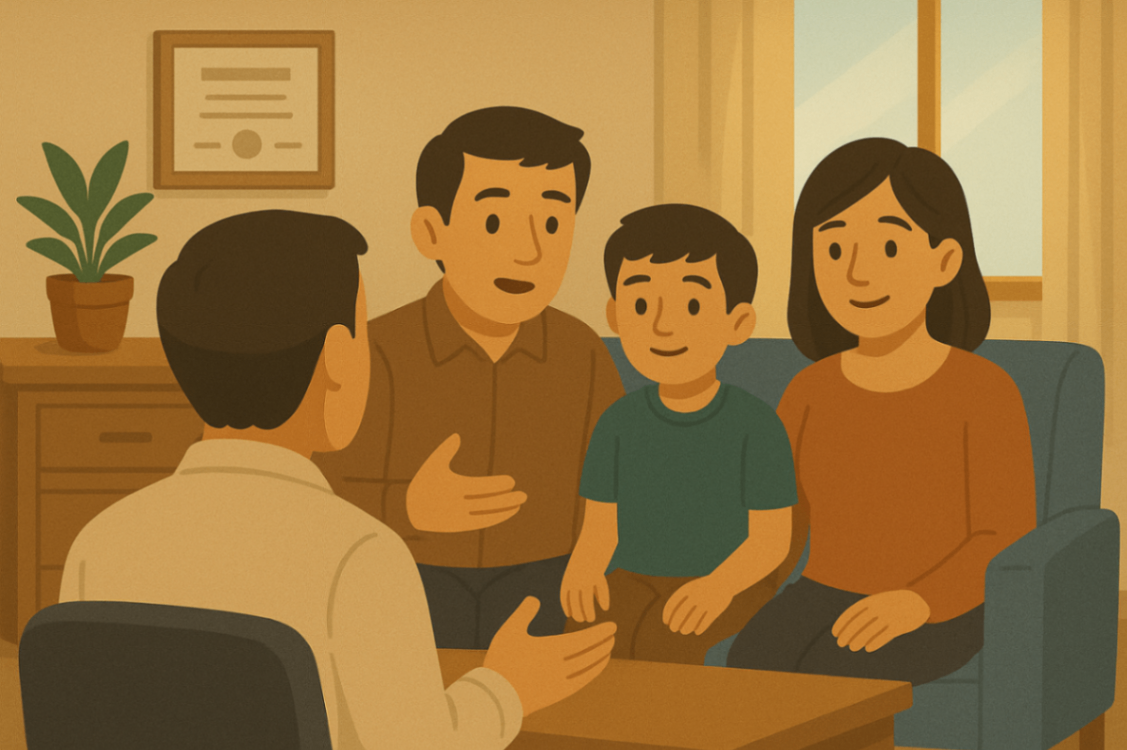
step-by-step: how to access specialised behaviour support liverpool
21 June, 2025
Dealing with hard behaviour in young people can feel like too much for families in Liverpool who want specialist behaviour support. Specialised positive behavioural support gives a clear way to help with emotional regulation and bring about positive changes. When people deal with these behaviour issues the right way, positive behaviour support makes daily life better and helps create a space where kids can do well. Positive Behaviour Support (PBS) gives families proven tools that fit what each person needs. This helps make real, long-term gains in quality of life. This blog gives you easy steps to follow so you can get this important care.
Key Highlights
-
Guidance for families in Liverpool on accessing specialised behaviour support, fostering positive changes.
-
Explaining the process to navigate the National Disability Insurance Scheme (NDIS) for behaviour support funding effectively.
-
Steps to identify and select a qualified behaviour support practitioner for addressing challenging behaviours.
-
Emphasising the critical role of partnerships between families and allied health professionals to ensure meaningful progress.
-
Addressing common queries about behaviour support services for improving young people's quality of life.
-
Highlighting the importance of strategies that promote positive behaviour and emotional regulation skills.
The Step-by-Step Process to Accessing Behaviour Support
 Understanding how to get specialised behaviour support starts with a few simple steps. These clear steps help families feel confident as they look for the right services. First, you need to spot the challenges your loved one is facing. Then, get advice from professional people who know about these issues. Next, you can look into funding options, like the NDIS. With the right help, families can meet with health professionals who know what to do. These trained experts will make a plan that is right for your loved one and their own needs.
Understanding how to get specialised behaviour support starts with a few simple steps. These clear steps help families feel confident as they look for the right services. First, you need to spot the challenges your loved one is facing. Then, get advice from professional people who know about these issues. Next, you can look into funding options, like the NDIS. With the right help, families can meet with health professionals who know what to do. These trained experts will make a plan that is right for your loved one and their own needs.
This whole process is about people working together. Families, schools, and health professionals talk to each other and share ideas. That way, your loved one will get the same type of care at home, at school, and in other places. If you take these steps, you help your loved one work on emotional regulation and better growth.
Initial Assessment and Referral Pathways
The first step to getting behaviour support is an early check by health professionals. This is needed to find out the main problems. In this step, health professionals and families work together to look at the child’s behaviour and see how it affects daily life. This whole check helps to make support plans that fit the child. Because of that, help for the child can really work.
Referral pathways are also very important. They give people clear steps to get to the right help. After talking about worries with the right people, families might get sent to allied health teams who know what to do for tough behaviours, including a family member’s behaviour that might be challenging. These pathways make sure families can get all the help they need.
Besides that, it is good to keep talking between parents, health professionals, and teachers. This kind of teamwork gives better and stronger help to families and makes things better for the child. Knowing about these first steps will help people understand how the NDIS and other support funding works.
Navigating the NDIS for Behaviour Support Funding
Securing National Disability Insurance Scheme (NDIS) funding for behaviour support involves understanding key steps. This pathway ensures families can afford therapy services tailored to their child's specific needs. To begin, families submit applications, including detailed assessments and developmental goals.
Once funding is approved, consultations with planners help families decide how to allocate resources effectively. Planners guide individuals in choosing appropriate funding categories, such as early intervention or support for psychosocial disabilities. These structured processes offer clarity and help families maximise targeted therapies.
|
NDIS Component |
Description |
|---|---|
|
Behavioural Support Funding |
Covers costs for therapy services tackling challenging behaviour and mental health needs. |
|
Type of Service |
Includes individual therapies, proactive interventions, and group workshops. |
|
Psychosocial Disability |
Supports emotional regulation and life skills for better daily functioning. |
By leveraging the NDIS, families gain the resources needed to access skilled specialists in this field effectively.
Finding a Qualified Behaviour Support Practitioner in Liverpool
 Finding the right support for your child in Liverpool means looking for a skilled behaviour support practitioner. You want someone who has training in positive behavioural methods. Make sure they have the needed certificates or credentials in behavioural analysis.
Finding the right support for your child in Liverpool means looking for a skilled behaviour support practitioner. You want someone who has training in positive behavioural methods. Make sure they have the needed certificates or credentials in behavioural analysis.
A good professional will help with emotional regulation and work on complex needs. They use proven methods to do this. Your family can get support designed for them, helping your child in daily life, building social skills, and growing emotionally. With these experts, you and your child get care and teamwork that support every developmental goal.
Key Qualifications and Experience to Look For
Choosing a good behaviour support practitioner means you have to look at their experience and skills closely. It is important that they know enough about mental health and how people act. The best professionals mostly have training in therapy strategies. They also hold advanced certifications. These things show that the practitioner can use interventions that help.
Key qualifications include:
-
They should have taken part in a graduate program or have certifications in Applied Behaviour Analysis (ABA).
-
They need to know a lot about essential life skills, and must also teach people how to deal with emotions well.
-
They must have real-world practice in using positive behaviour support ideas, so you get useful and lasting change.
-
They should understand NDIS rules, which helps fit the right funding for your therapy.
The right practitioners make their plans to suit each person. They also include family situations and behaviour goals in the plans. When you work with someone who has the right experience, you get real, long-term results. This is important for anyone who needs help with bigger emotional and social problems.
Questions to Ask When Choosing a Provider
Choosing the right behaviour support services is important. You want to make sure they fit your child's needs. When you talk with people who might help, be sure to ask the best questions. Find out what they know and how they work with children.
Think about these questions:
-
"What types of services do you offer, and are they covered under the NDIS?"
-
"How do you create a supportive environment for children facing behavioural challenges?"
-
"Can you clarify your team's qualifications and their experience collaborating with families?"
-
"What specific tools or methods do you use in individual therapy sessions?"
The answers help you see if the team likes to work with families and cares about your child's feelings. A good provider will build trust. They offer support that is just right for your child. With the right team, your child can grow. You can see lasting changes over time.
Collaborating with Behaviour Support Practitioners
Successful progress depends on strong teamwork between families and the people who help them. Behaviour support specialists work side by side with families to make plans that help with emotional regulation. In this way, the support fits the child’s needs and uses proven methods.
In addition, health professionals and allied health experts, like speech therapists and psychologists, also be part of the team. They help by looking at many areas of a child’s life. By working together, families and these practitioners make plans that do more than help with behaviour. They also help children grow stronger and learn new things. Let’s look at the way this planning takes place in the next section.
Developing an Individualised Support Plan
An effective behaviour support plan is made just for the needs of each child. The plan is made so it can help with the child's main challenges and build good behaviour to promote good behaviour. Practitioners use these plans to make steps that help with emotional regulation and behavioural issues. The focus is on the main goal of improving daily routines and helping positive changes happen for the child.
These support plans use therapy methods that follow the best advice from research. They often help the child learn ways to handle feelings, match tools for coping to what triggers their behaviour, and adjust the environment so the child feels calm. Family and parents should help with the plan. This way, the plan fits in with the whole family, and it also works well outside the home.
An individualised support plan is a real guide you can use to see progress in addressing behavioural challenges and behaviour problems through behaviour analysis. It helps make changes you can measure, so it is important in behaviour therapy. The benefits go to the child and their family, with positive changes and less stress for everyone.
Role of Family and Allied Health Professionals in Ongoing Support
Family involvement is very important in keeping the impact of behaviour therapy strong over time. Parents play an active role. They use things learned in therapy at home and help their child build skills. When we see how important this is, kids get to use what they learned in both daily life and in therapy.
Allied health professionals, like speech therapists and dietitians, add more help and ideas for children who need extra support. When these health professionals work with families, they make sure the plans fit the specific needs of each child and involve physical activity for the prevention of chronic diseases, as well as to help with mental health and emotional regulation. By teaming up, families and health professionals can help children handle new changes and tough days better.
When health professionals and families work together, children get even better support. This helps them grow strong skills for emotional regulation in daily life, contributing positively to their psychological health. Everyone coming together gives children a steady way to learn, making their lives and mental health better each day.
Talk to a Behaviour Support Specialist Near You
Families in Liverpool and nearby suburbs like Wattle Grove, Mount Pritchard, Chipping Norton, and Green Valley can get expert help with behaviour support for a family member. There are skilled people who make sure each family gets a plan that fits their needs. They look at what is best for you and create a personal therapy plan for each young person.
You can choose from workshops or online telehealth appointments, including daar’s programs and workshops. This way, the support can fit into your daily life. The team works with you, whether you want to go to the clinic or have them visit your home. These services cover different ways to help young people handle their emotions in a better way.
If you or your family want some help, don’t wait to contact the support teams around you. Getting to know these specialists can really help your family bring good changes and make daily life better. Together, you can help create the kind of space that helps everyone grow and move forward in their lives.
Book your consultation now – and take the first step toward building lasting, meaningful support.
Conclusion
Getting behaviour therapy support in Liverpool can feel hard at first, but knowing each step can help make it easier. When you follow the steps, like having first meetings and looking for trained people, you can make sure your family gets the right support. It helps to work with behaviour support workers and to bring your family along in the process. This way, the support can fit what each person needs. Keep in mind, asking for help shows you care and want the best for your child. With the right tools and support, you can help improve how your child acts and feels each day. If you are ready to move forward, reach out to a behaviour support expert near you to see how they can help your family.
Before you begin, don’t miss Preparing for Your First Behaviour Support Appointment: A Parent’s Checklist.
Frequently Asked Questions
How long does it take to start receiving behaviour support in Liverpool?
Specialised behaviour support usually starts a few weeks after the first check and when the referral is done. The staff works closely with young people, their families, and others to help make daily routines better. This way, they can get good results fast. The timing can change based on when a worker is free and when the money is sorted out.
Is specialised behaviour support covered by the NDIS for all children?
The NDIS gives behaviour support to eligible children. This can be for kids with autism spectrum disorder or mental health issues. What you get can change based on your funding category, such as psychosocial disability. Look at your own plan to see which therapy services are there for you.
What does a typical behaviour support plan include?
A behaviour support plan uses different ways to help teach new skills. It also helps grow important life skills and keep good behaviour going. The plan is made for each child to match their development. It helps with emotional regulation and teaches the child how to talk and share thoughts in the right way.
Can parents and caregivers be involved in the sessions?
Yes, parents and caregivers have an important part in behaviour support. Providers help create a supportive environment where families work together to build on the skills taught during sessions. When parents and caregivers get involved, it makes things more steady. This helps people make better progress.
How do I know if my child is making progress with behaviour support?
Signs that there is progress show up when you see better good behaviour and better emotional regulation. You may also notice a meaningful impact on daily life. Watch out for positive changes like smoother transitions. These things mean the behaviour strategies work. All these steps help to make the quality of life better.
.svg)

















